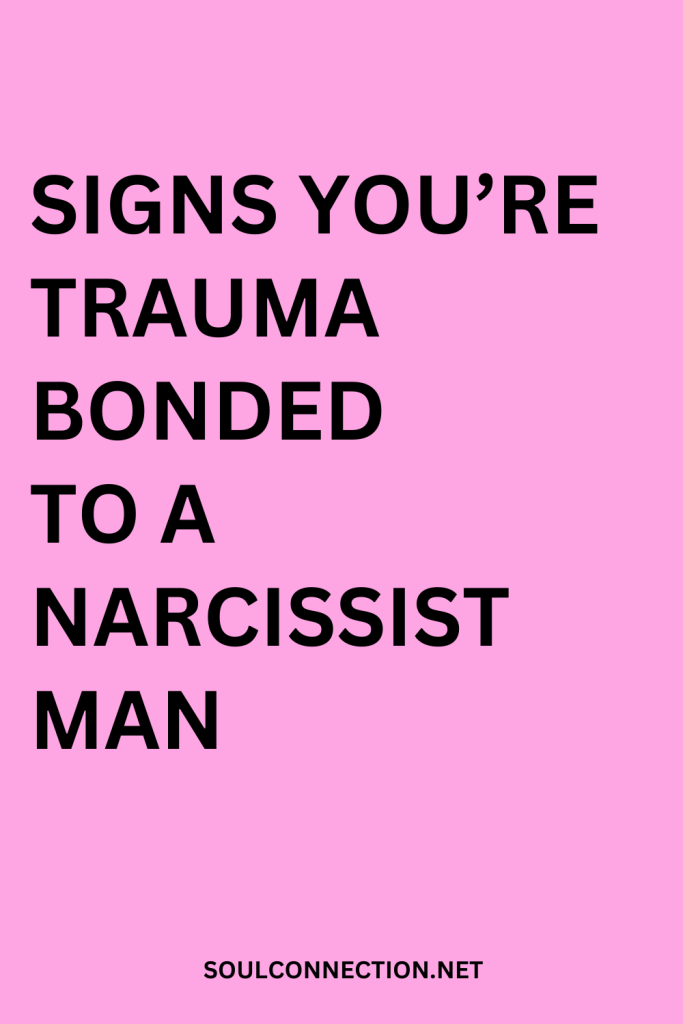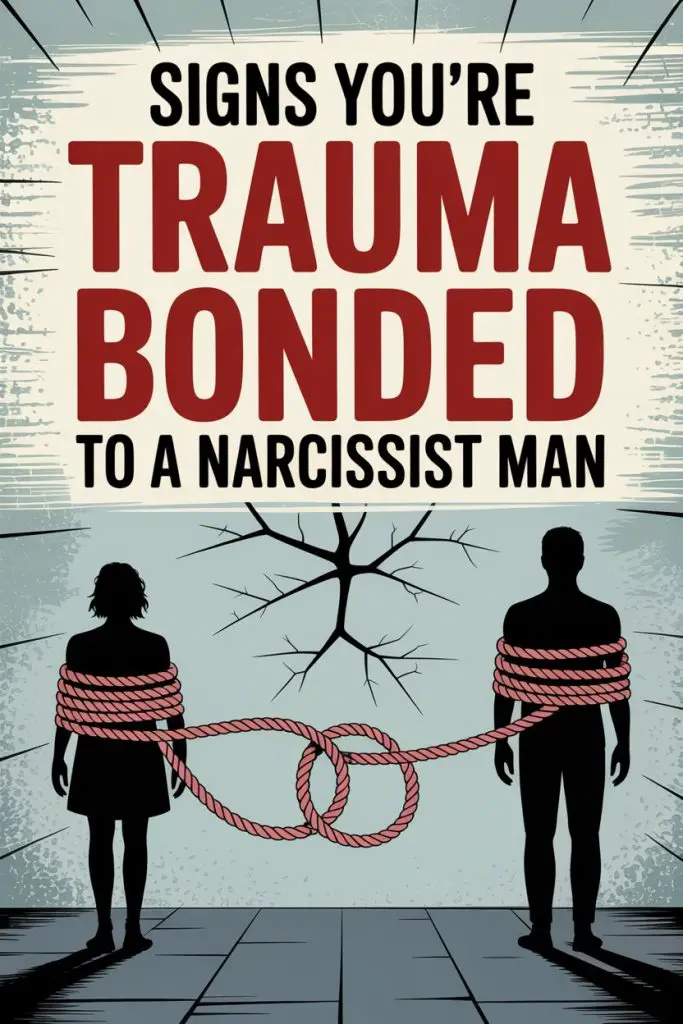Trauma bonding and narcissism—a match made in emotional purgatory.
If you’ve ever found yourself stuck in a cycle of highs and lows, second-guessing your sanity, and wondering how you became the emotional equivalent of a rubber band, you’re not alone.
Many folks get lured in by a narcissist’s charm, only to find themselves entangled in a web of confusion and attachment that’s tough to escape.
Here’s how to spot the signs you’re trauma bonded to a narcissist man—and what you can actually do about it.
Your Emotions Are on a Rollercoaster (and He’s Controlling the Ride)
One week it’s passionate love notes and “you’re my soulmate.” The next, you’re left out in the cold, wondering what on earth you did wrong.
With a narcissist, these wild cycles aren’t accidental—they are the point. Trauma bonding thrives on unpredictability. The constant swing between affection and rejection gets you hooked, always hoping the “good times” will come back.
If you find yourself walking on eggshells, dreading his next mood swing, or frantically searching for ways to get back into his good graces, that’s not love. That’s the push-pull of trauma bonding.
You Blame Yourself for His Bad Behavior
Narcissists have a knack for flipping the script. Maybe he forgot your birthday or belittled you in front of friends, but somehow, you’re the one apologizing by the end of the night.
You start to believe that if you were just smarter, sexier, or a little less “needy,” he’d treat you better.
This kind of self-blame is classic trauma bond territory. When you’re always the problem, he’s always off the hook. Newsflash: a partner who keeps shifting blame onto you is dodging responsibility.
That’s not a flaw in you—that’s emotional manipulation 101.
You Excuse or Hide His Toxicity
“He’s just stressed with work.” “He’s not usually like this.” “You don’t know him like I do.”
Sound familiar? Trauma bonds run on secrecy and denial. You might find yourself minimizing his outbursts, making excuses to your friends, or even editing stories to paint your partner in a better light.
If you’re working harder to defend him than he is to actually change, it’s a red flag waving right in your face.
You Crave His Approval Like It’s Oxygen
A narcissist’s validation feels amazing—until it doesn’t. When he doles out crumbs of approval, it can feel like winning the lottery.
But when he withholds it, you might spiral into anxiety and self-doubt, desperate to win him back.
This craving isn’t a sign of “true love.” It’s a symptom of trauma bonding, where your self-worth becomes tied to his fleeting attention. Healthy love doesn’t make you feel like you’re constantly auditioning for the part of “worthy girlfriend.”
Boundaries Are a Foreign Concept (or Get Bulldozed)
Maybe at first, you said “no” to things that made you uncomfortable. But over time, he’s pushed and pushed, until your boundaries are practically invisible.
Maybe he goes through your phone, mocks your friends, or expects you to drop everything for him.
When standing up for yourself feels impossible—or when boundaries are met with rage, guilt trips, or silent treatment—that’s not compromise. That’s control.
Trauma bonding makes it hard to remember where you end and he begins, but your needs matter just as much as his.
You’re Isolated from Friends and Family
Narcissists love to be the center of your universe. If he’s subtly (or not-so-subtly) nudged you away from the people who care about you, it’s not just possessive—it’s dangerous.
You might notice fewer texts from friends, or you’re making excuses for why you can’t see your family.
This isolation keeps you more dependent on him, which deepens the bond and makes breaking free feel nearly impossible. Newsflash: the people who truly have your best interests at heart will never ask you to cut out your support system.
You Can’t Imagine Life Without Him—Even When You’re Miserable
It’s the worst kind of catch-22. You fantasize about leaving, but the thought of actually doing it sends you into a panic. Trauma bonds are sticky because the narcissist has become your source of pain and your only perceived remedy.
If you’re terrified of being alone, or you convince yourself that no one else will “get” you, it’s not a sign you’re soulmates. The relationship has hijacked your sense of self—and it’s time to get that back.
You Keep Hoping He’ll Change (Spoiler: He Won’t)
Ever find yourself daydreaming that the kind, loving version of him will magically reappear?
Maybe you chase that “honeymoon phase” you had at the very beginning, or you just know that if you hang on a little longer, he’ll finally see how much you love him.
Here’s the kicker: narcissists rarely change. If the promise of “better days ahead” is the only thing keeping you in the relationship, the trauma bond is running the show.
Waiting for a personality transplant is a full-time job with terrible benefits.
Your Self-Esteem Has Tanked
Remember when you felt confident, funny, and capable? If you’re now a shell of your former self, that’s not an accident. Narcissists chip away at your self-worth until you start to believe you’re lucky to have them.
Watch for signs like second-guessing your choices, avoiding social situations, or feeling unlovable. These aren’t personal failings—they’re symptoms of being emotionally battered, over and over. Healing starts when you realize you deserve better.
You’re Addicted to the Apology Stage
After every blow-up, there’s the “I’m so sorry” act. Maybe he brings flowers, writes a tearful message, or promises the moon. Suddenly, he’s charming, attentive, and swears he’ll do better.
This is classic trauma bond bait. The brief periods of kindness keep you hooked, convincing you the pain was worth it. Rinse, repeat. Healthy relationships don’t require you to survive emotional hurricanes just to see the sun.
You Keep Secrets About the Relationship
Maybe you’ve stopped telling friends the whole truth. Maybe you’re embarrassed by things he’s done or said, or you fear people will judge you for staying.
Secrecy is the narcissist’s best friend. If you’re hiding the ugly bits, it’s not just about privacy—it’s about protecting the illusion of your relationship. Real love can stand up to sunlight.
You’re Always the One Trying to Fix Things
If you’re constantly researching how to “communicate better,” looking up ways to “support a difficult partner,” or buying every self-help book Amazon recommends, it’s worth asking: is this relationship actually fixable, or are you carrying the emotional weight for two?
Trauma bonds convince you that if you just try harder, you can make things work. Relationship problems are never solved by one person doing all the heavy lifting.
You Don’t Trust Your Own Reality
Gaslighting, anyone? Narcissists are magicians when it comes to making you doubt what you saw, heard, or felt.
If you find yourself questioning your memory, or apologizing for things you didn’t do, that’s not poor recall—it’s psychological warfare.
When you can’t trust your gut, life starts to feel like a never-ending episode of “Was it me?” Trust me: it wasn’t.
Escaping the Cycle
Trauma bonds can feel unbreakable, but freedom is possible. Start by confiding in someone you trust—a friend, therapist, or support hotline.
Putting your experience into words is the first step toward reclaiming your power.
Rebuild your support system, even if it’s just one person. Set boundaries, and don’t be afraid to enforce them. You’ll probably face pushback from your narcissist partner; expect it, but don’t let it shake you.
Self-care isn’t just bubble baths and Netflix (though no judgment if that’s your jam). Journaling, exercise, or just walking outdoors can help reset your nervous system and remind you of life outside the relationship.
Most of all, forgive yourself. Trauma bonds are strong because they’re engineered to be. The fact that you’re reading this means you’re ready to break the cycle, and that’s no small feat.
Finding Your Way Back
You’re not crazy, weak, or naive for falling into a trauma bond with a narcissist man. These relationships are masterclasses in manipulation, and anyone can get caught up in them.
But tough as it feels, every step you take away from the chaos is a step toward peace—real, lasting, drama-free peace. You deserve love that feels safe and steady, not love that makes you question your worth.
Here’s to swapping rollercoasters for solid ground.


